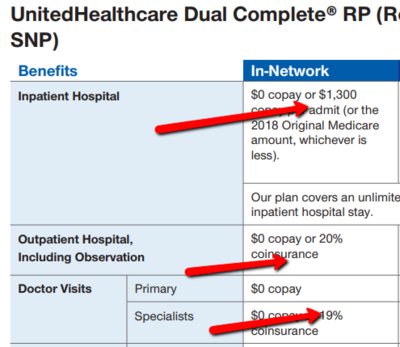Navigation
Install the app
How to install the app on iOS
Follow along with the video below to see how to install our site as a web app on your home screen.
Note: This feature may not be available in some browsers.
More options
You are using an out of date browser. It may not display this or other websites correctly.
You should upgrade or use an alternative browser.
You should upgrade or use an alternative browser.
slmb qualifies for a partial snp? And...
- Thread starter keith365
- Start date
What are the copayments going to be for a slmb that qualifies for a partial dual eligible snp with uhc? Uhc couldn't tell me. They told me to ask Medicaid. Medicaid won't know what uhc will pay! Who has dealt with this? Thanks!
Yeah that’s always a tough one. I try to stay away from Medicaid for this reason but in FL UHC doesn’t accept partial. Only full Medicaid or qmb so it makes it simpler.
Some partial plans here still say it’s all Zero’s but a couple of them say “$0 or “x” amount of dollars depending on your level of Medicaid”.
Those I stay away from usually.
I would try to talk to a local area rep for UHC. They won’t know at the 1800 number but your local rep will.
- 5,056
Depending on the state there are DSNP's for partial dual eligibles. They usually are not completely cost share protected, but in a lot of instances even someone who is SLMB or QI can get a plan with a lots of zero co-pays. If you see an SNP that accepts SLMB, and it has the "Or's", the member is always responsible for the amount to the right of the word "Or", like below...


What is shown on the last post is correct.The UHC Dual Complete plan in Ohio allows for folks that qualify for SLMB to join their DE SNP plan. If you are going to offer this plan to prospects/members, you must be clear of the following. The member that only has SLMB will be responsible for the same co payments they would have if they only used the Red, White, and Blue Medicare card. That is FFS, Original Medicare co payments and deductibles apply as opposed to the co pays for the typical MAPD plan. So they may be responsible for the full cost of a specialist visit until they reach the annual Part B deductible. That may compare to a $40 co pay if they were on a $0 premium HMO. Their payments are like being on Original Medicare where they do make a co payment at the time of the office visit. They only pay after the provider bills UHC. Often times these folks are also eligible for the states's HCAP program, which would cover their co pays if their HCAP eligibility is current. You have to be sure that the folks you enroll in this plan understand what their potential cost sharing will be.
policywunk
Guru
- 542
What is shown on the last post is correct.The UHC Dual Complete plan in Ohio allows for folks that qualify for SLMB to join their DE SNP plan. If you are going to offer this plan to prospects/members, you must be clear of the following. The member that only has SLMB will be responsible for the same co payments they would have if they only used the Red, White, and Blue Medicare card. That is FFS, Original Medicare co payments and deductibles apply as opposed to the co pays for the typical MAPD plan. So they may be responsible for the full cost of a specialist visit until they reach the annual Part B deductible. That may compare to a $40 co pay if they were on a $0 premium HMO. Their payments are like being on Original Medicare where they do make a co payment at the time of the office visit. They only pay after the provider bills UHC. Often times these folks are also eligible for the states's HCAP program, which would cover their co pays if their HCAP eligibility is current. You have to be sure that the folks you enroll in this plan understand what their potential cost sharing will be.
Thats how the UHC DSNP works in Fl. too.One thing I learned was that if the member has already met part B deductible for the year on original medicare or on another ma plan for the year they dont have to pay it again when they switch to UHC .
I've enrolled several SLMBs in this plan. You have to be very clear about the co pays but most really like all the extras and if they can qualify for HCAP, they don't have copays for those providers. Alot of times the copays are less than what they would pay if they were enrolled in a zero premium MAPD.
Similar threads
- Replies
- 6
- Views
- 889
- Replies
- 2
- Views
- 649
- Replies
- 2
- Views
- 314
Latest posts
-
Life Insurance and Annuities are Valuable Financial Tools
- Latest: Dale M Krause
-
